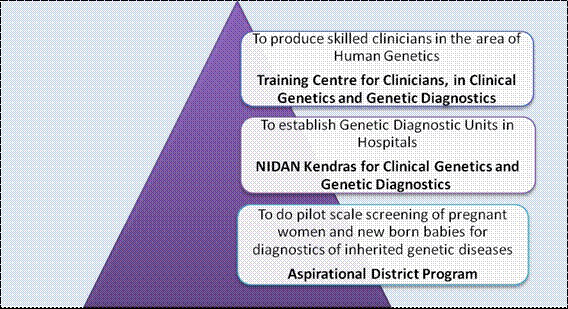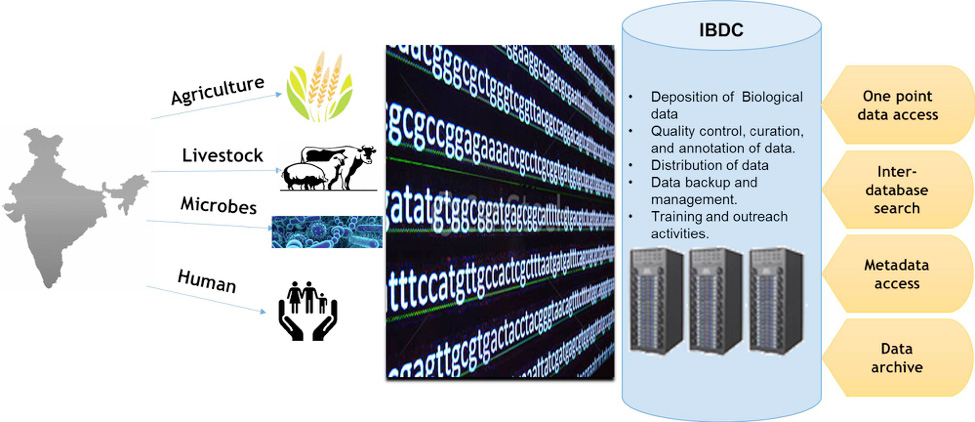Science & Technology
Year End Review: Department of Biotechnology (DBT)
- 06 Feb 2021
- 10 min read
Important Schemes and Policies
UNATI Atal Jai Anusandhan Mission Programmes
- UNATI Atal Jai Anusandhan Mission has been implemented by DBT with a major focus on improved agriculture, affordable healthcare, clean energy and cutting-edge frontier science as per details given below:
GARBH-ini (interdisciplinary Group for Advanced Research in BirtH outcomes- DBT India Initiative) study
- It aims to discover molecular risk-markers and generate a risk-prediction algorithm for preterm birth which will facilitate timely referral and care for at-risk mothers, thus saving children’s lives and reducing morbidity.
- This programme has established a unique pregnancy cohort comprising more than 8000 women to study Pre Term Birth (PTB).
- The GARBH-ini platform comprises a bio-repository (Rakshita) of well characterized clinical phenotypes.
Antimicrobial Resistance (AMR) Mission
- It will focus on development of new antibiotics, alternatives to antibiotics and diagnostics.
- To address the rising threat of antimicrobial resistance (AMR) with a holistic and multi-sectoral (One Health) approach, “India’s One Health Initiative” to combat problems associated with AMR was launched.
Ind-CEPI Mission
- It is an India centric collaborative mission of DBT aligned to the global initiatives of CEPI (Coalition of Epidemic Preparedness Innovations).
- DBT is supporting the implementation of the Ind-CEPIs mission “Epidemic preparedness through rapid vaccine development.
- Support of Indian vaccine development is aligned with the global initiative of the Coalition for Epidemic Preparedness Innovations (CEPI)”, at BIRAC, PSU of DBT.
UNATI Mission
- Clean Technologies for Swachh Bharat: DBT has developed various technology platforms designed to convert different solid, liquid and gaseous wastes into renewable fuels, energy and useful products such as food, feed, polymers and chemicals.
- Under the UNATI Mission, 10 promising clean technologies have been identified for demonstration with DBT support at different sites across India, in collaboration with local stakeholders such as municipalities and other urban local bodies.
- The identified technologies include bio-methanation, constructed wetland, bio-toilets, chemical & membrane free water purification etc.
Mission COVID Suraksha
- Mission COVID Suraksha is India’s targeted effort to enable the development of indigenous, affordable and accessible vaccines for the country and will complement the ongoing mission of Atmanirbhar Bharat.
Partnerships for Accelerating Clinical Trials (PACT)
- The PACT (Partnerships for Accelerating Clinical Trials) programme has been launched for supporting COVID-19 vaccine development activities in partnering countries.
- The initiative is being implemented by Biotechnology Industry Research Assistance Council (BIRAC) and Clinical Development Services Agency (CDSA) under the aegis of the National Biopharma Mission and Ind-CEPI Mission of DBT.
National Biopharma Mission
- It is the first ever Industry-Academia mission “Industry-Academia Collaboration National Biopharma mission. The mission aims for Accelerating Discovery Research to Early Development for Biopharmaceuticals.
- “Innovate in India (i3) Empowering biotech entrepreneurs & accelerating inclusive innovation “ to accelerate biopharmaceutical development in India.
Unique Methods of Management of Inherited Disorders (UMMID) Initiative
- The Department launched the ‘UMMID’ initiative to tackle inherited genetic diseases in newborns.
Pan India Genome India
- Genome India was initiated for cataloguing the genetic variation in Indian population with a goal for whole genome sequencing and subsequent data analysis of 10,000 individuals representing the country’s diverse population to help build an exhaustive catalogue of genetic variations in Indian population, and to aid in the design of a genome wide association chip for Indian population.
LOTUS HR Project
- LOTUS HR project: In collaboration with Netherlands, a toolbox of wastewater treatment technologies has been established on site at Barapullah drain to facilitate selection of treatment combinations for optimum treatment of wastewater.
Indian Bioresource Information Network (IBIN)
- It was created to bring together all the available databases and information on the bio-resources and biodiversity of the country in one platform.
- The satellite telemetry tracking of Jacobin Cuckoo is a part of IBIN project in collaboration with Wildlife Institute of India to monitor the changes in Indian monsoon patterns and could help in planning the conservation and climate monitoring programmes.
Indian Biological Data Centre (IBDC)
- It was established by DBT for deposition, storage, annotation and sharing of biological data generated in the country through extensive funding from various Government Organizations.
- The IBDC will enable life science researchers to deposit biological data in a central repository and thus safeguard data generated using public resources from loss. It will perform quality control, curation, and annotation of data.
- These efforts will help establish benchmarks for the quality of data deposited and thus improve the quality of experimental research conducted in the country.
GenoVault
- GenoVault (Cloud based Genomics Repository) was launched in the Accelerating Biology 2020.
- This cloud-based genomic repository enables quick archival and retrieval tools along with extremely powerful analytical engines.
- GenoVault is a first India’s Genomics Repository based on OpenStack cloud. This centralized repository would be of enormous importance for healthcare and would have great use in personalized medicine.
Bio-liposome mediated CRISPR-Cas9 delivery system
- A novel bio-inspired lipid nanocarrier system for efficient intracellular delivery of CRISPR-Cas9 based genome editing tools has been developed.
- The development of bio-inspired lipid nanocarrier delivery systems would open new vistas for devising novel gene therapy-based therapeutic solutions for various rare and genetic diseases.
Biotech-KISAN
- Biotech-KISAN has created a platform in each of 15 agro-climatic zones of the country, which aims to connect farmers and scientists to promote Agriculture Innovation and take the new interventions to the farmers and farms.
International Cooperation
- The department of biotechnology has strengthened its partnership with the Academy of Medical Sciences (AMS), UK to launch the AMS-DBT Newton International Fellowship (NIF).
- Focusing on the threat of climate change, the department collaborated with European Union for the “Green Deal” under the Horizon 2020 framework to help build a low-carbon, climate-resilient future.
Biotechnology Industry Research Assistant Council (BIRAC)
- BIRAC launched i4 (Intensifying the Impact of Industrial Innovation) to support biotechnological product/technology development by strengthening R&D capabilities of start-ups/companies/LLPs. The programme provides impetus for pulling the translational ideas past PoC and taking them further along the innovation chain for validation, scale-up, demonstration and pre-commercialization of products and technologies.
Wheat Straw Polysaccharide
- DBT-National Agri-Food Biotechnology Institute (DBT-NABI) has developed a wheat straw polysaccharide derived novel edible coating formulation to prevent the post-harvest shelf-life of perishable fruit crops such as Apple, Peach and Banana.
- In addition to that, antibody assisted graphene oxide coated gold nanoparticles for rapid bacterial detection and near infrared light enhanced antibacterial activity has been developed which detects food borne pathogens.
DBT-National Brain Research Institute (DBT-NBRC) Research
- Japanese Encephalitis virus (JEV) infection was found to induce classical activation (M1) of microglia that drives the production of pro-inflammatory cytokines, while suppressing alternative activation (M2) that could serve to dampen the inflammatory response, thereby inducing inflammatory response, microglial activation, and neuronal apoptosis.
- ‘DALI’ a tool in Indian languages for dyslexia assessment in children developed at NBRC remains in high demand and is being increasingly adopted countrywide.
- BRAHMA and ANSH: NBRC scientists have developed specialized tools named BRAHMA and ANSH for integrating inputs from neuroimaging data and the clinical information to help in diagnosis of various brain diseases such as Alzheimer’s and Parkinson’s.
- The tool is standardized on a robust Indian brain template that is representative of the Indian population-specific brain anatomy.








